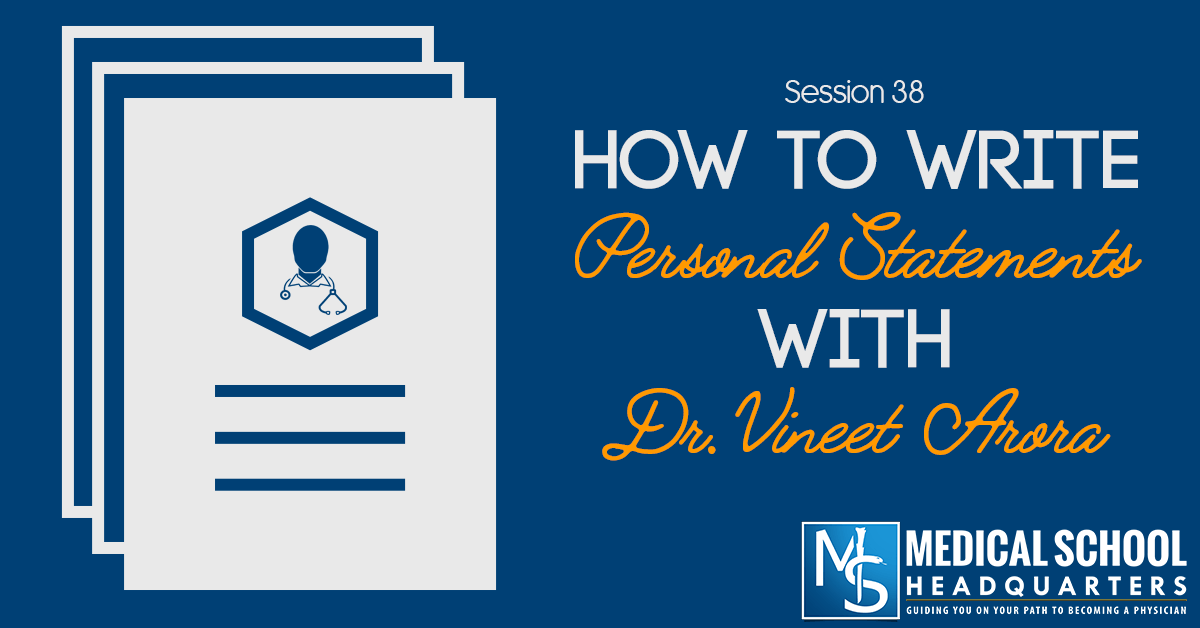You still have time to sign up with one of our amazing expert advisors! Learn More!

In today’s episode, I talk with Dr. Vineet Arora from FutureDocsBlog.com about the do’s and don’ts of writing your personal statements. These tips apply to medical school personal statements as well as residency personal statements.
Some specific topics we cover are whether to write about depression and other mental health issues in your personal statement, and whether to include quotes in your personal statement.
Vineet is the Associate Program Director for the Internal Medicine Residency and Assistant Dean of Scholarship & Discovery at the Pritzker School of Medicine for the University of Chicago. She has been in the residency recruitment committee for the past 10 years. She coaches people in writing personal statements and has worked as a career advisor in the medical school.
Listen to this podcast episode with the player above, or keep reading for the highlights and takeaway points.
Since this episode was recorded, I’ve published a book all about the medical school personal statement. My book distills and collects all I’ve learned about the personal statement from working with students for years. Check it out: The Premed Playbook: Guide to the Medical School Personal Statement.
When a medical school offers you an interview, it is usually based on:
[Related episode: Should I Write About Red Flags in My Personal Statement?]
Dr. Arora actually advises not to rotate at the hospital of the residency you want to match into if you think you’ve got your numbers and you’ll get an interview without it. Auditioning beforehand can give the program more data points, and it could backfire if you do poorly during your rotation.
Let people you know read your personal statement, as well as people who don’t know you to avoid bias, balance your personal statement, and help it all come together.

Lorem ipsum dolor sit amet, consectetur adipiscing elit
I just received my admission to XXXXX! This is unreal and almost feels like I am dreaming. I want to thank you for all of your help with my application. I cannot overstate how influential your guidance and insight have been with this result and I am eternally grateful for your support!
IM SO HAPPY!!!! THANK YOU SO MUCH FOR ALL YOUR HELP, IM INDEBTED TO YOU! Truly, thank you so much for all your help. Thank you doesnt do enough.
I want to take a few moments and thank you for all of your very instructive, kind and consistent feedback and support through my applications and it is your wishes, feedback, and most importantly your blessings that have landed me the acceptance!
I got into XXXXX this morning!!!! It still has not hit me that I will be a doctor now!! Thank you for all your help, your words and motivation have brought me to this point.
I wanted to once again express my heartfelt gratitude for your help in providing feedback during my secondary applications. Your guidance has been instrumental in my journey.
Just wanted to share my wonderful news! I received my first medical school acceptance! Thank you for all that you do for us Application Academy!!!
I am excited to tell you that I just got my third interview invite from XXXXX today! I can’t believe it. I didn’t even know if I was good enough to get one, let alone three – by mid-September. Thank you so much for all of your help and support up to this point; I would not be in this position without it!!
I wanted to thank you for helping me prepare for my XXXXX interview. Even in a 30-minute advising session, I learned so much from you. Thank you for believing in me, and here’s to another potential success story from one of your advisees!
I just received an acceptance with XXXXX! This is so exciting and such a huge relief and so nice to have one of our top choice schools! I also received an interview with XXXXX which brings the total up to 20 interviews! Thank so much, none of this would have been possible without you!

Join our newsletter to stay up to date
* By subscribing you agree to with our Privacy Policy and provide consent to receive updates from our company.
Resources
Advising Services
Podcasts & Youtube
Books
About
Deal Lasts for

"*" indicates required fields